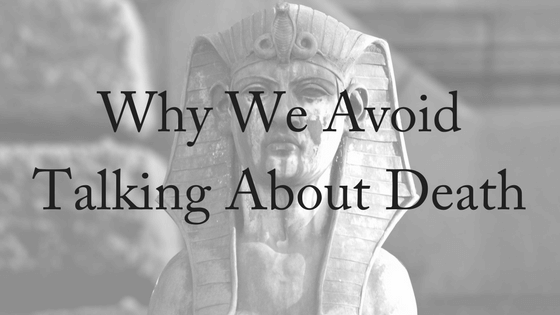Why do we find talking about death so hard? There are multiple conversations in life that are hard to discuss; the end of every relationship, the rejection of a job opportunity or even having THE talk with our kids. However, no conversation seems harder to discuss then the one involving the topic of death. Talking about death is taboo in our culture: we use synonyms or small phrases that imply what we are discussing or we just simply ask to ‘talk about this another time’. But why is death so hard to discuss?
Many people just simply don’t feel prepared for the talk; and so with gentle words we procrastinate what could be a simple conversation – sometimes until it’s too late. Perhaps you have children and don’t want to think about leaving them on their own, or perhaps you are in lots of debt. Whatever the reason, you just do not feel prepared for death. To be fair, no one ever is, but being uncomfortable with taking steps to prepare for death is not reasonable for you or your loved ones.
Talking About Death: The Conversation You Have To Have
 Perhaps talking about death may cause trouble within the family unit. It may cause a dispute or simply scar those close to you. It is traumatizing to think that someone close to you will not live forever, and some just may not be emotionally ready for this conversation. Or perhaps talking about death may lead to a conversation about financial arrangements or funeral wishes, and this may lead to a heated dispute. In anticipation of conflict, perhaps you believe the topic should just never be discussed.
Perhaps talking about death may cause trouble within the family unit. It may cause a dispute or simply scar those close to you. It is traumatizing to think that someone close to you will not live forever, and some just may not be emotionally ready for this conversation. Or perhaps talking about death may lead to a conversation about financial arrangements or funeral wishes, and this may lead to a heated dispute. In anticipation of conflict, perhaps you believe the topic should just never be discussed.
Talking about death brings awareness to the fact that we don’t know how long we’ll live. Some of us will have a long innings and some of us will be taken too young. What we do know is that everyone will die. Talking about death may bring up sadness, grief or discomfort; but it’s important to know that not talking about death can bring up conflict among those you leave behind.
Unfortunately, talking about death is essential. Letting your loved ones know of your final wishes is essential. Having that dreaded conversation will communicate your final wishes regarding your funeral, your burial wishes, the care of your minor children if necessary, and the bequest of your assets and sentimental items. You can also identify who you would like to handle your estate, who will take over the care of your children, and who will get each piece of sentimentality. You can also inform your loved ones of what medical arrangements you wish to have if through illness or injury you lose your capacity. You may worry the conversation may lead to disappointment, sadness or conflict, but these emotions are almost guaranteed if your final wishes come as a surprise to your loved ones following your death.
It is always easier and cheaper to discuss the inheritance of property, even if it creates a dispute between family members, while you are still alive. Asking the court to mediate the dispute following your death is always more costly and draining. If you have the conversation now, you are present and able to help in understanding the feelings of those involved.
 By avoiding talking about death and having the correct provisions in place, you are leaving difficult decisions up to the court, and your family might have to live with consequences that you wouldn’t have wanted. Some family members might miss out on an inheritance altogether while others get assets you wouldn’t have wanted them to have. Your children could be cared for by guardians you wouldn’t have chosen. Assets might be sold that you would have wanted to remain in the family. There are so many unknowns that might happen – just because you haven’t prepared adequately for your death.
By avoiding talking about death and having the correct provisions in place, you are leaving difficult decisions up to the court, and your family might have to live with consequences that you wouldn’t have wanted. Some family members might miss out on an inheritance altogether while others get assets you wouldn’t have wanted them to have. Your children could be cared for by guardians you wouldn’t have chosen. Assets might be sold that you would have wanted to remain in the family. There are so many unknowns that might happen – just because you haven’t prepared adequately for your death.
Talking About Death
Firstly, ask yourself the following questions:
- How do you feel about your own death?
- Do you know what you want to happen after you die?
- Who do you want to tell or inform of your wishes?
- How will you ensure your wishes are completed?
After you have answered and pondered on these questions, it’s time to start letting people know. Talk to your family members and begin writing a will. Make sure that you seek the appropriate legal advice from a specialist in wills and estates. Estate planning is a complex area of the law.
By talking about death, we begin to think about what decisions will support our family after we pass away. We are encouraged to think about others and ourselves; and we become aware of others feelings. It can help you to make informed decisions and encourage others to begin discussing the topic.
There is no person who has their complete life in order and there is no use in waiting for the ‘perfect’ moment to discuss what happens after death. Don’t hold out for when everything is perfect, instead, start discussing things now. It’s never too early to be prepared.
Contact us today to get your estate planning rolling. We offer a FREE, 10-minute phone consultation.

